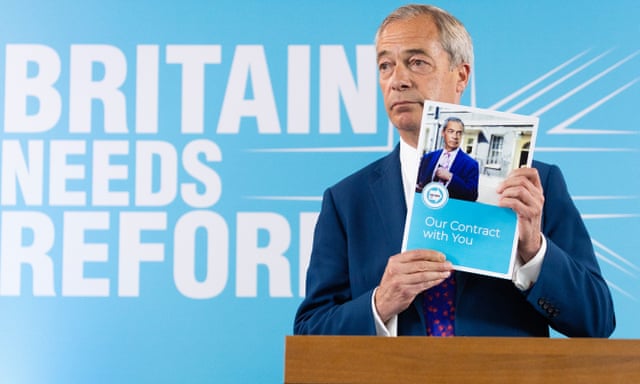Policies include personal tax cuts and life imprisonment for drug dealers in ‘contract’ with British public
Nigel Farage has launched the Reform UK manifesto with a number of populist pledges including proposed spending of £141bn a year as the rightwing party seeks to make inroads into Labour heartlands.
Policies in the Reform programme, which Farage claimed was not a manifesto but a “contract” with the British public, included axing the net zero plan entirely and introducing life imprisonment for convicted drug dealers, along with wide-ranging cuts to personal tax, which have been greeted with scepticism by economists.
Tax cuts include raising the minimum threshold for income tax to £20,000 a year, abolishing stamp duty and abolishing inheritance tax for all estates under £2m.
Reform said it planned to fund the cuts by raising £40bn from reducing the interest paid on Bank of England reserves.
Launching the party’s election pledges in Merthyr Tydfil, south Wales, Farage said the former industrial town was “skint” and “in real trouble” as he suggested having a “slimmed-down public sector” while maintaining services.
Farage claimed that Reform’s plans amounted to a “fundamental change” of Britain’s economy and society and that the biggest beneficiaries would be people “trapped on benefits”.
“There is a lot more here for those on the lower end of the income scale than anyone else,” he said.
However, the manifesto advocates abolishing inheritance tax for all estates, as well as reducing the corporation tax rate from 25% to 20%.
The document also makes a play for social conservatives with calls for marriage to be supported with a 25% transferable marriage tax allowance, allowing for no tax on the first £25,000 of income for either spouse.
The party would freeze “non-essential” immigration, pull Britain out of the European convention on human rights and “pick up illegal migrants out of boats and take them back to France”.
On law and order, the party backed mass stop and search policies, with Farage telling the event that it was time for the police to “stop worrying about whether they are called prejudiced”.
Farage pledges to axe net zero as Reform UK launches populist manifesto...
4 posts
• Page 1 of 1
Farage pledges to axe net zero as Reform UK launches populist manifesto...
-

dutchman - Site Admin
- Posts: 56945
- Joined: Fri Oct 23, 2009 12:24 am
- Location: Spon End
Re: Farage pledges to axe net zero as Reform UK launches populist manifesto...
The Reform Contract is well worth reading.
Of course it'll fit; you just need a bigger hammer.
-

rebbonk - Posts: 71828
- Joined: Thu Nov 12, 2009 6:01 am
Re: Farage pledges to axe net zero as Reform UK launches populist manifesto...
I've noticed Reform is picking-up support from minority-interest groups such as anti-ULEZ and fieldsports.
They all add-up and could have a disproportionate effect on the final outcome?
They all add-up and could have a disproportionate effect on the final outcome?
-

dutchman - Site Admin
- Posts: 56945
- Joined: Fri Oct 23, 2009 12:24 am
- Location: Spon End
Re: Farage pledges to axe net zero as Reform UK launches populist manifesto...
Reform predicted to win highest ever number of seats in new poll
A new poll has predicted that Reform UK will win 18 seats at the general election, the highest forecast for the party to date.
The MRP poll by Find Out Now and Electoral Calculus predicted that party leader Nigel Farage, chairman Richard Tice and Tory defector Lee Anderson will all win seats on July 4.
The poll gave Labour a majority on 450 seats and predicted that the Liberal Democrats would become the opposition with 71 seats, 11 ahead of the Conservatives on 60.
If the poll was replicated on election date, Reform would win 17 per cent of the national vote share, two points ahead of the Conservatives on 15 per cent.
Reform’s previous poll high was seven seats, which Survation predicted last week.
A total of 19,993 voters were surveyed between June 14 and 24.
-

dutchman - Site Admin
- Posts: 56945
- Joined: Fri Oct 23, 2009 12:24 am
- Location: Spon End
4 posts
• Page 1 of 1
Who is online
Users browsing this forum: No registered users and 5 guests
-
- Ads




